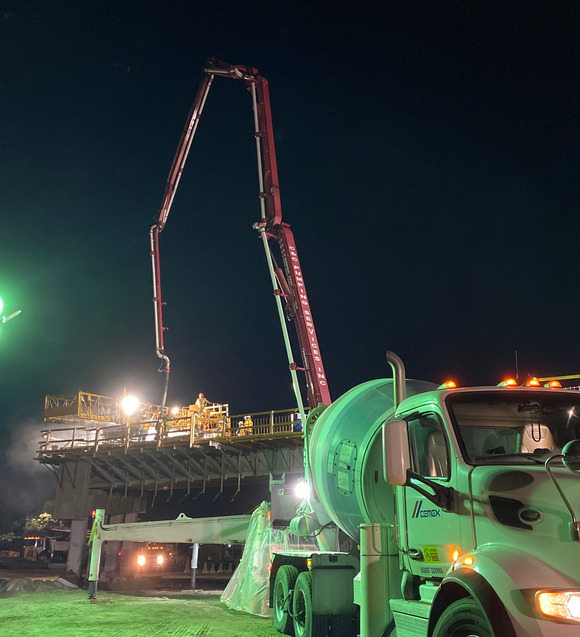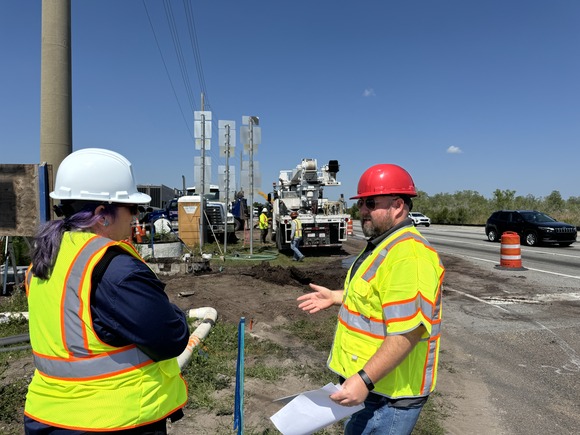|
|
Safety is the top priority for the Florida Department of Transportation (FDOT), and to maintain a safe environment throughout Florida’s roadways and active construction zones, the Department needs leaders who will work to prioritize safety for motorists and pedestrians alike. District Five Construction Engineer for the FDOT Orlando Operations Center Ryan Flipse excels in prioritizing safety by viewing construction projects from the user’s perspective and building strong relationships with the communities that the projects impact. “As I drive through the projects, I look for confusing maintenance of traffic, potential safety issues and ways we can improve the experience for motorists and pedestrians,” Flipse said. He added that safety plays an important role in how communities perceive construction projects. “It (community relations) ties in with safety,” he said. “They (communities) put the effort forward to allow us to come in and support our projects, and we want to make sure we do our part and deliver it safely, as clean as possible, and in a timely manner.” As a construction engineer, Flipse is tasked with overseeing consultant projects managed by construction engineering and inspection (CEI) teams, like those throughout I-4 Beyond the Ultimate. Additionally, he gets his hands dirty as a senior project engineer for in-house projects, which are not assigned to consultants. Flipse has worked as a construction engineer for two and a half years but has been with FDOT for more than seven years. Before he became a construction engineer, he worked as a construction manager, a construction senior project manager, and on project oversight, but he has construction experience beyond those roles. Before joining FDOT, Flipse worked as a construction materials tester and a CEI and previously served as an inspector’s aide. “I graduated from high school, and I got into construction engineering and inspection because of my wife, who was my girlfriend at the time,” Flipse said. “Her father was in the industry, and he took me under his wing as an inspector aide.” Flipse’s career in engineering was also influenced by an architect who lived next door when he was growing up. “I’d go over to his house and see these huge models and think they were so cool,” Flipse said. “I slowly realized that I leaned more towards creating something and problem-solving, and I figured that civil engineering was best suited for me in that way.” In order to complete projects on time and within budget, Flipse said it is important for anyone interested in the field to be able to communicate, collaborate, and understand others. “You need to be an active listener,” Flipse said. “I make sure I’m not listening with the intent of waiting on my turn to speak, but listening to actually hear the person so I can take in what they’re saying, and sometimes that means repeating it back, so we both understand what the expectation is.” When he’s not working, Flipse said he enjoys spending his time with his family at the beaches in Volusia County, the Brevard and Sanford zoos, and the Orlando Science Center. “I’d say the majority of my time is focused on my family,” he said. “We’ll spend a whole day at the Science Center going from floor to floor. It’s very interactive and fun for the kids.” Flipse said he’s always available to talk about construction. “I encourage anyone to reach out to me if they’re going through any sort of issues with their projects, struggling with career choices, or looking for an answer on something,” he said. “Even if I can’t help you, at least I’ve made a connection with you.” |
Summer is almost here, and as one of the world’s most popular vacation destinations, Florida will experience a predicable jump in the number of cars on the roadways. The Florida Department of Transportation (FDOT) and the Florida Department of Highway Safety and Motor Vehicles (FLHSMV) observe Safe Summer Travel Month throughout June and urge motorists to take care while traveling during the upcoming summer months. Here are some tips to help you and your passengers stay safe while roadway activity increases this summer. Beware of the Heat The internal temperature of a vehicle parked outside in the summer can rise 20 degrees within 10 minutes. These temperatures can be dangerous and even life-threatening. Never leave children, vulnerable adults, or pets in a parked car. In fact, it’s a good idea to get in the habit of always checking your back seat for passengers before leaving your vehicle. If you happen to come across a child, vulnerable person, or pet in an unattended parked car, call 911. Keep Your Vehicle Road Ready It’s important to keep up with your vehicle’s maintenance year-round, but during the summer there are several components that require special attention:
Prepare in Advance for Longer Road Trips If you’re planning a significant road trip, your checklist is longer to ensure your vehicle is road-trip ready. Have a mechanic inspect your battery and belts and test your brake lights, turn signals, interior lights, and emergency flashers. Ask for a topping-off of coolant, oil, windshield washer fluid, transmission fluid, and power steering fluid. Always travel with an emergency roadside kit in your vehicle. Here are some items the National Highway Traffic Safety Association (NHTSA) suggests you include in your kit.
Have a plan in place before you get behind the wheel. Check the weather forecast, get familiar with your route, and determine where you will take breaks. Driving while tired can be just as dangerous as drinking and driving. Buckle Up, Drive Sober, and Obey Speed Limits
For more information on safe summer travel, visit flhsmv.gov/safety-center/driving-safety/safe-summer-travel/. |
|
|
||||||
|---|---|---|---|---|---|---|---|
|
|||||||
|
|||||||






